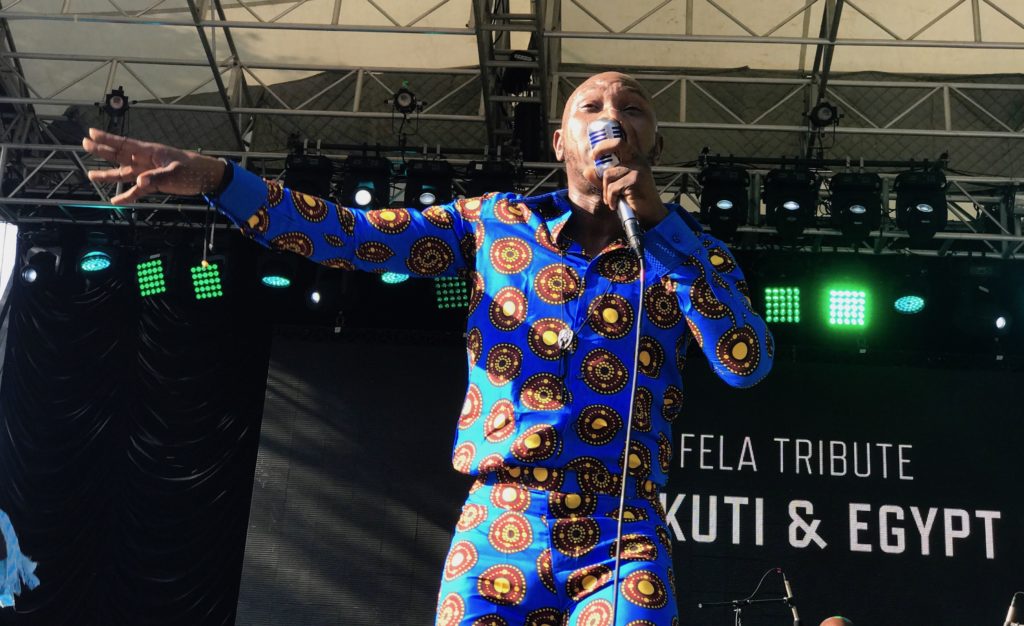
Seun Kuti, youngest son of legendary Afrobeat music pioneer Fela Anikulapo Kuti, performs on stage on July 2017 at the Rumsey Playfield at New York Central Park. Photo by Kemi Osukoya
Kemi Osukoya
THE AFRICA BAZAAR magazine
July 2018″
Fela’s ideology drew people to his music and the band. The Shrine was very inclusive for both the marginalized and elite members of the Nigerian society.
EXCLUSIVE – It’s not everyday that I get a chance to play a real life, but much older version of William Miller from the film, Almost Famous. I had that chance last summer when I received an exclusive backstage all access to a Fela Tribute Concert in New York.
The backstage access and the subsequent interview with Seun Kuti, one of the sons of legendary African musician and cultural icon Fela Kuti, was not at all planned. It all started when I met a new friend at a local jazz concert, who informed me about Seun’s concert performance the following day at New York Central Park. I had no idea what to expect, but was very excited to attend the concert.
Seeing and meeting Seun in person was like meeting Fela. Seun is an identical image of his legendary father in every sense. They have the same figure and mannerisms, as well as the impulse to say whatever is on their mind, politically, without worrying about the obvious consequences.
I grew up listening to my uncles playing Fela’s music.
I remember on several occasions on weekend afternoons during my early childhood years in the 70s, hearing Fela’s trademark symphony of African percussion, drums, horns, trumpets, sax and his pidgin English lyrics music oozes from the phonograph player as I play in my paternal grandparents’ living room. The sounds and tempo permeated our home, bringing it alive with music and dance.
Fela and King Sunny Ade were two of the most played African musicians in our household. These two musicians embody the uniqueness of African rhythm — an amalgamation of traditional and modern musical instruments synchronized in a distinctive tempo that has been adapted to the African dance steps. You hear their music and instantly want to get up and dance.
But that similarities end there.
King Sunny Ade’s Juju music and songs tend to be more of a feel good music that appeals to the masses, while the key to Fela’s musical appeal is the way he skillfully delivered bewitching upbeat grooves, married to politically supercharged messages cloaked in songs.
Fela, — the man, his music and lifestyle — were both controversial and inspirational in its singular vision of using Afrobeat music to mobilize and promote a sense of Africanism on the African continent and beyond.
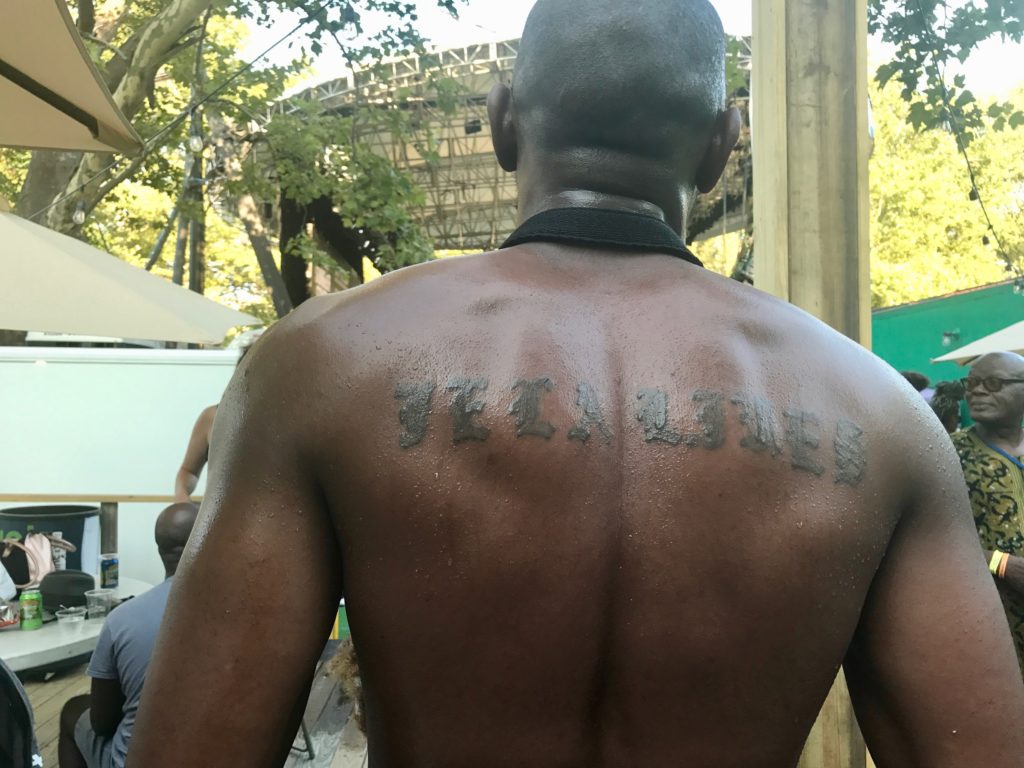
Tattooed on Seun Kuti’s back is “Fela Lives,” a tribute to his legendary Afrobeat pioneer late father, Fela Anikulapo Kuti. Photo by Kemi Osukoya.
It is obvious to say Africa lost one of its most indisputable treasures, and could have been left with a vast musical void after Fela died at the age of 59 in 1997 if his two sons, Femi and Seun Kuti, have not figuratively and literally stepped into their father’s musical shoes.
Musical dynasties are rare. The Fela Anikulapo Kuti family is one of the exceptions from Africa.
To watch either one of Fela’s sons, Femi Kuti or Seun, sing and perform on stage is to appreciate the mastery of what Fela created, and his ingenious and generous musical gift, not just to Africa, but to the music industry at large.
Those who knew Fela very well when he was alive knew he was renowned for the intense focus he brought to every detail of his Afrobeat music. From how he creates a song, and put the finishing touches to that song, to the band rehearsals, in some cases hours of rehearsals and fine tuning until everything hit the right tone and become perfect.
Seun Kuti, his youngest son, has taken a similar passion to writing and creating his own Afrobeat music. Designing, and redefining each song until it reaches his desired eloquence.
Seun, obviously, was very much influenced by his father. You hear it when he talks about his music, and his inspiration, he immediately referred to his father.
After Fela died in 1997, Seun became the heir to Fela’s afrobeat band, Egypt 80, having played with the band since a very young age.
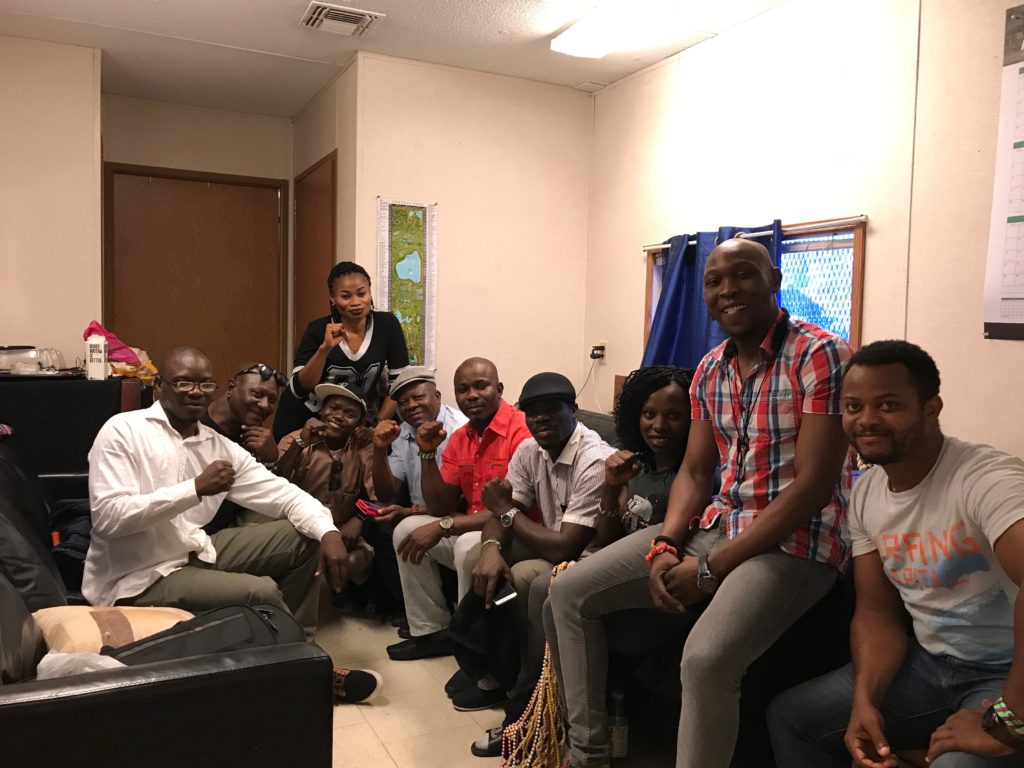
Backstage, members of Seun Kuti & Egypt 80 at the Fela Tribute concert in New York City. Photo by Kemi Osukoya.
When he inherited and became the leader of the Egypt 80 band at 14 years old, the first thing Seun did is to keep the band exactly as it was when Fela was alive, adhering to the adage “if it ain’t broke, don’t fix it,”
That singular decision has not only kept the family’s fifty years-plus musical dynasty in business, it has also helped him to redefine and reclaim his father’s legacy to a new generation of music listeners.
As Seun explains to me during an exclusive interview with the Africa Bazaar magazine, Fela was larger than life and is still the ultimate inspiration for him and his brother Femi, their band and many other musicians.
“Growing up with my Dad, for me, he is the ultimate inspiration for my music,” Seun tells me. “[Me] wanting to be a musician and living the life of a musician was from being around him and watching him do what he did.”
Seun started going on music tours with his father at a very young age and like any child who adores his father very much, he became enchanted watching Fela and his band performed on stage. He wanted to be like his father. He asked his father for an audition to join the band during the group’s music tour in New York City in 1990 at the legendary Apollo Theater in Harlem.
“As a child, you don’t know the complexity of life. You just know what you see, but don’t understand what is behind it,” he tells me, smiling as he fondly recalls that earliest memories of accompanying his father on music tours. “As a child, I just thought it was the easiest job ever to do. I always could sing, so I asked my Dad for an audition. That’s the funniest thing, and he gave it to me.”
Seun was seven years old when he asked his father for an audition, which his father happily obliged.
How did he know what he wanted at that age and know how to prepare for an audition? I asked him.
“I didn’t even prepare,” he tells me. “I asked [Fela] and he said sing a song ,and I sang one of his songs, “Sorrows, Tears and Blood.” I can never forget that— the look on my Dad’s face as I sang.” As he recalls this sentimental special moment between him and his father to me, Seun begins signing the lyrics to the song, “There’s be sorrows, tears and blood/ them regular trademarks/them regular trademark,” in what I will underscore to be a rare sentimental moment for the three people in the room, which includes me, his girlfriend, and manager.
(Just try to imagine for a moment that you’re interviewing Bruce Springsteen or Bono from the U2 band, and he starts singing and performing in front of you, I bet you will also find it special too.)
Without missing a beat, he continues the conversation after his performance. “That was the precise song that I sang and [Fela] said, ‘okay, not bad.’”
Just as that audition moment with his father is still sentimental for him, I will also always remember that intimate performance Seun gave to us in that room.
After he auditioned for his father, Fela agreed to let him join the Egypt 80 band. Seun started practicing and playing with the band once they returned to Lagos. He quickly learned and picked up the piano, saxophone as well the nuances of his father’s music business.
Since that time, he has grown, matured and evolved not just in age, but also musically, fiercely channeling Fela’s fiery energy. Yet, he remains humble enough to acknowledge and respect his place in the grandeur of his father music legacy and lineage, while also carving out his own image.
In 2008, he released his debut album “Many Things,” which was produced by his father’s music producer, Martin Massionier. In April 2011, he released From Africa with Fury: Rise, His latest album, “Black Times,” was released earlier this year in March.
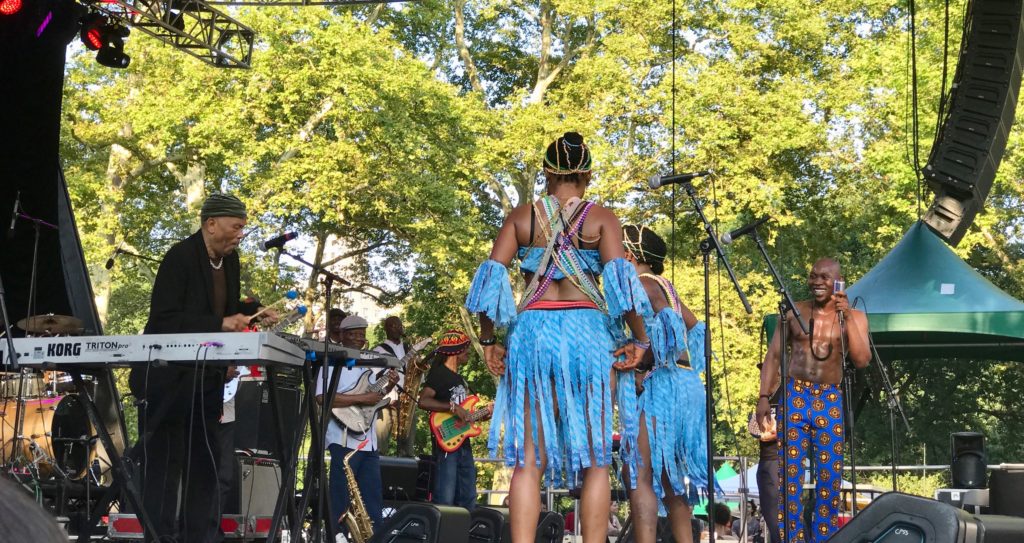
Seun Kuti & Egypt ’80 shares the stage with Roy Ayers during a concert performance at the Fela Tribute concert in New York. Photo Kemi Osukoya.
At the time of our interview last year, Seun was still putting the finishing touches to the Black Times album, which was scheduled to come out later that September, he told me. However, the album was released several months later than expected. He was heading to Los Angeles, following the concert performance in New York, to meet up with guest artists that will perform on the album. As it turned out, one of those guest was Carlos Santana.
The new album, which features the legendary guitarist and music icon Carlos Santana, is a call for solidarity, and unification of people regardless of race, to elevate humanity. A call to people to embrace black identity and pride.
Seun, who like his father believes and embraces Africanism culture and identity, is a social commentator, and critic of elite groups, particularly those from and living on the African continent.
“The album is inspired by solidarity of humanity because for me the real struggle is the class struggle,” he tells me during the interview and goes on to elucidate what he means. “A lot of the people that are trapped in poverty all over the world are black and brown people and I believe our working class comrades in Europe and America could be more considerate about the plights of their comrades in the black and brown world other than ignoring that.”
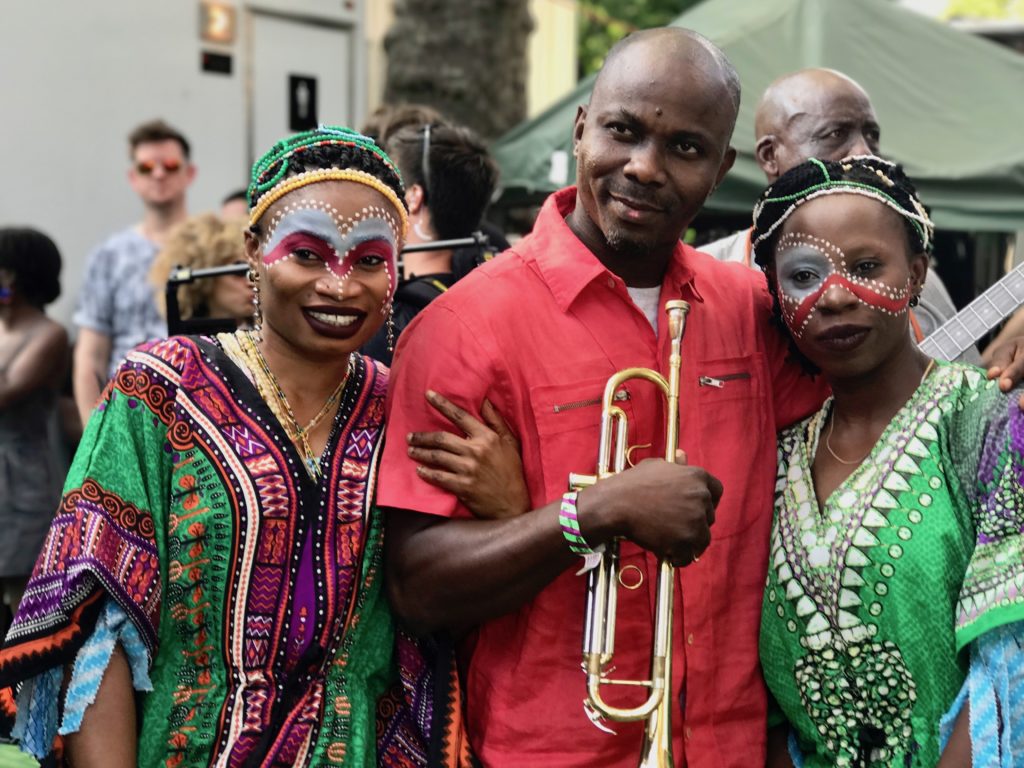
Backstage, the members of Seun Kuti & Egypt 80 band pose for a picture before their performance. Photo by Kemi Osukoya.
“The album is a call for unification of humanity to understand that call together and elevate all of humanity, not just a privilege few,” he says. “So for me,” he continues, “that’s the deep inspiration because all over the world, I see a lot of black and brown people being labeled and subjugated and oppressed under elite narrative of what’s going on in the world. For me, that’s what the album is about and it’s what inspired me to start to write.”
Indisputably, writing protest songs has been hard wired into his DNA since he joined his father’s band. However, carrying on the Afrobeat music to a new generation while maintaining the musical high bar set by Fela might seem unattainable and can easily sink an unskilled, and untalented musician. Seun, in no doubt has succeeded. Upon seeing his stage performance, anyone who ever doubted him to carrying on his father’s legacy will immediately see that not only has he morphed into Fela, one could say he has triumphed over into an extraordinary performer in his own right.
For half a day on a sunny Sunday last July, I got a chance to join Seun and his Egypt 80 band backstage at the New York Central Park prior to their performance at the Rumsey Playfield in Central Park.
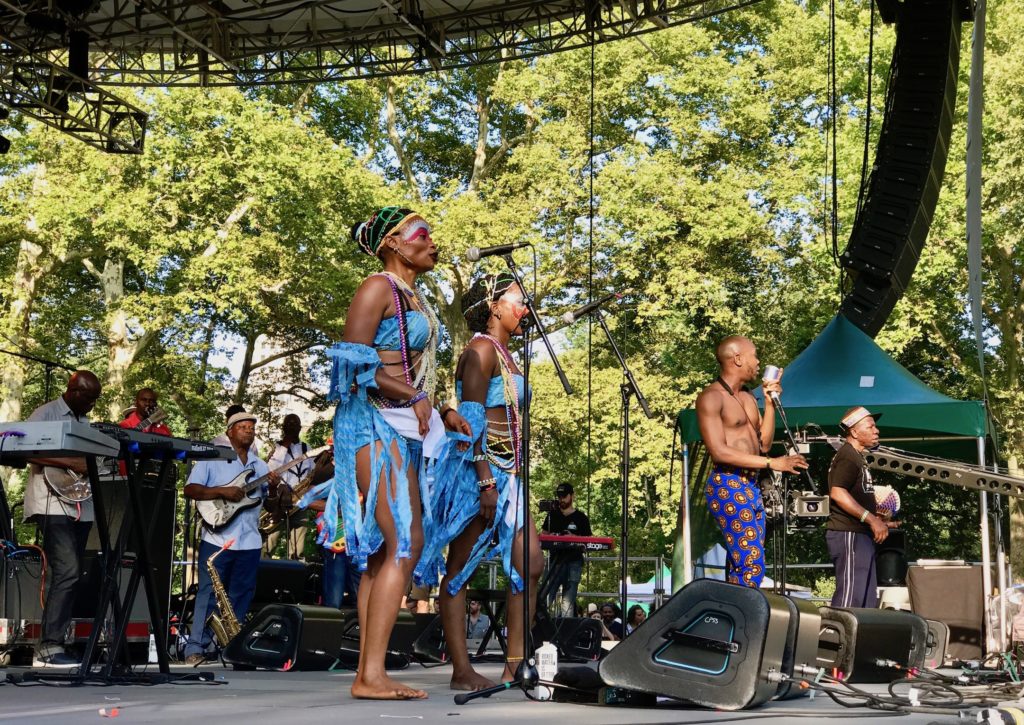
Seun Kuti and his dancers performed during the Fela Tribute concert at the Rumsey Playfield. Photo by Kemi Osukoya
The concert, a Fela Tribute featuring Seun Kuti & Egypt 80, Roy Ayers, the Underground System and Rich Medina, organized by Ben Levy, a music producer and manager of legendary black music icon Ray Ayers, is the first concert and stage performance for Seun and his band in New York City in nearly a decade.
Seun and his band did not disappoint the audience who have waited long enough to see the band perform again in NYC.
For me, it was enthralling watching them backstage and onstage.
Backstage in a trailer room, I sit on a chair, inconspicuously in a corner of the room, while observing and quickly taking notes of the band’s activities as they prepare, rehearse songs, fine tuned musical instruments, and get dressed for their stage performance that evening.
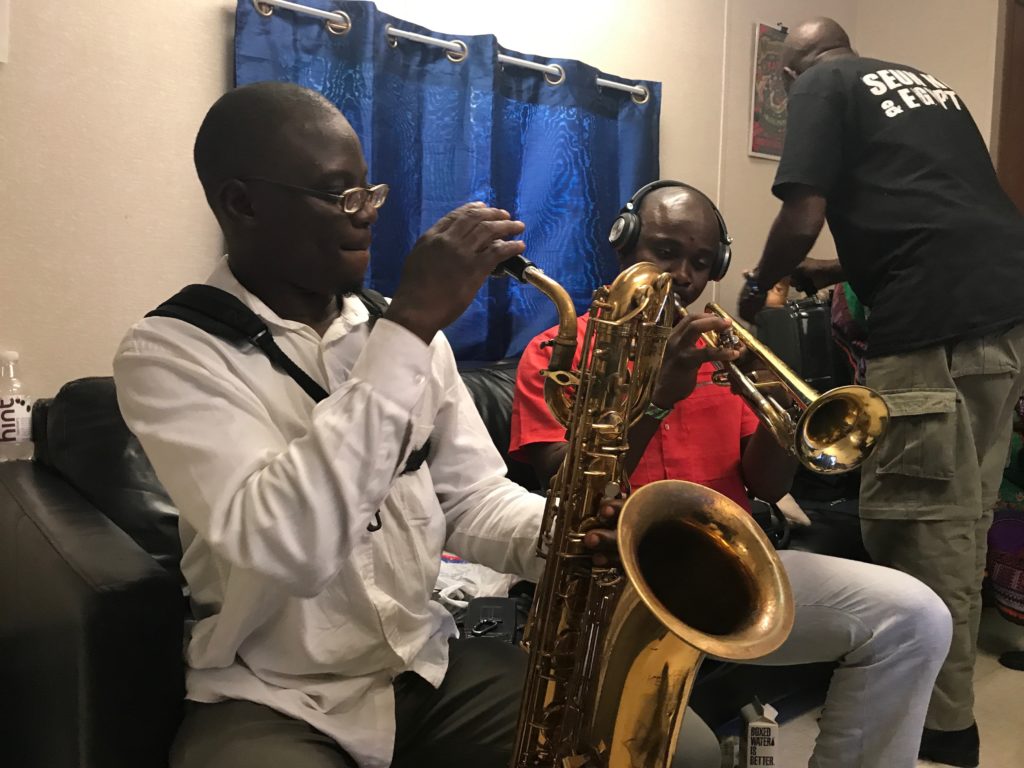
Backstage, members of Seun Kuti & Egypt 80 prepared and texted their instruments before their live performance at Rumsey Playfield in New York City. Photo by Kemi Osukoya.
Like most edgy band, they have their own rituals that they partake before going on stage. For Seun and some of the band members, smoking a little joint before their stage performance is all part of the creative process.
I have never smoked in my life. But that afternoon, I tried not to let the poignant smell of cannabis bothered me too much. Moreover, the experience of being backstage at a music concert was in its own way a lot more intoxicating and exhilarating for me than the smell of weed.
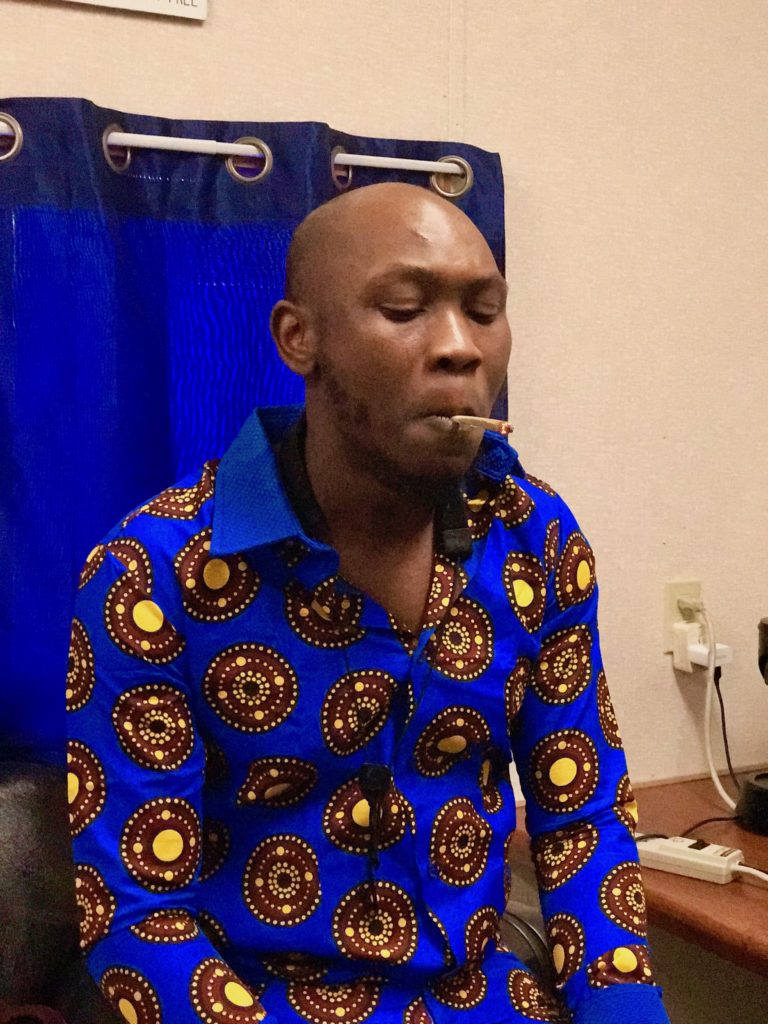
Backstage, Seun Kuti takes a moment to enjoy a special ritual just moment before going on stage to perform for the audience at the Rumsey Playfield at New York Central Park. Photo Kemi Osukoya.
So much of the band’s powerful and effortless stage performance lies in its passion, uniformity, loyalty and respect, among the band members. This was obvious to me from the ways they interact with each other. Though it is hard to judge a band’s closeness and how they get along after observing them for a day. What I found to be distinctive about the band is an unpretentious camaraderie, and a joyful and happy sense of a family loyalty among the band members as they laugh, tease and tell jokes with each other and their band leader, whom they affectionally refers to as the “Chairman.”
Most of the members have been with the Egypt 80 band since its formation when Fela first started the original Egypt 70 band in the 70s. For them, the Afrobeat music and the Fela legacy is a singular vision and lifestyle that’s based on loyalty above all.
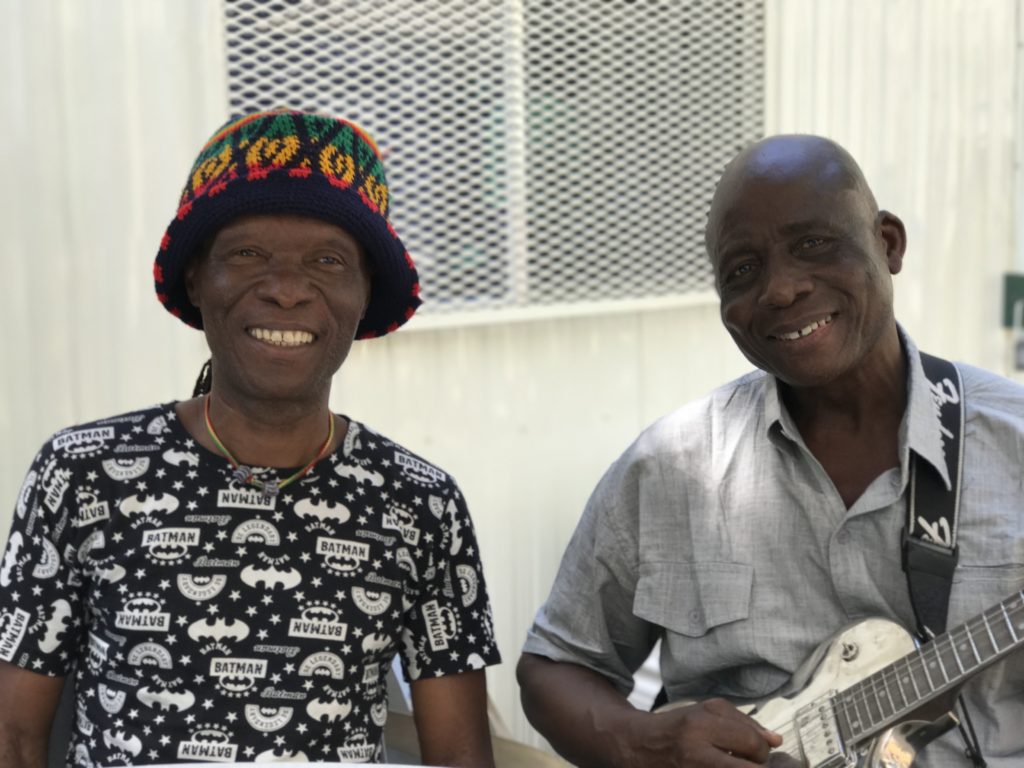
Backstage at New York Central Park’s Rumsey Playfield, two senior members of Egypt 80 take a moment to relax. Photo by Kemi Osukoya
“The reason why I came to Fela is because of his ideology,” a senior band member who joined Fela’s band in the early 80s tells me. “When we talk about their music, Seun’s music and Fela’s music are different in their deliveries, but they both carry the same political message. Their message concept remains the same.”
Prior to becoming a member of the Egypt 80, he was living on the street of Lagos for many years, ostracized from his family in Nigeria, he tells me. Fela’s Kalakuta compound in Ikeja, Lagos became a home for him.
“Fela’s ideology drew people to the band. It was inclusive for both the marginalized and the elite members of the Nigerian society,” he continues. “Everybody was welcome at the Shrine. So to carry on [Fela’s] legacy through Seun and mentor the new generation of musicians that are coming into the band is based on passion rooted in our loyalty to the man.”
I watch as Seun walks his way from backstage to the Rumsey Playfield stage, along the way greeting, shaking hands, and hugging friends, and fans who have came, as far as London, to say hello to him backstage and see him perform on stage.
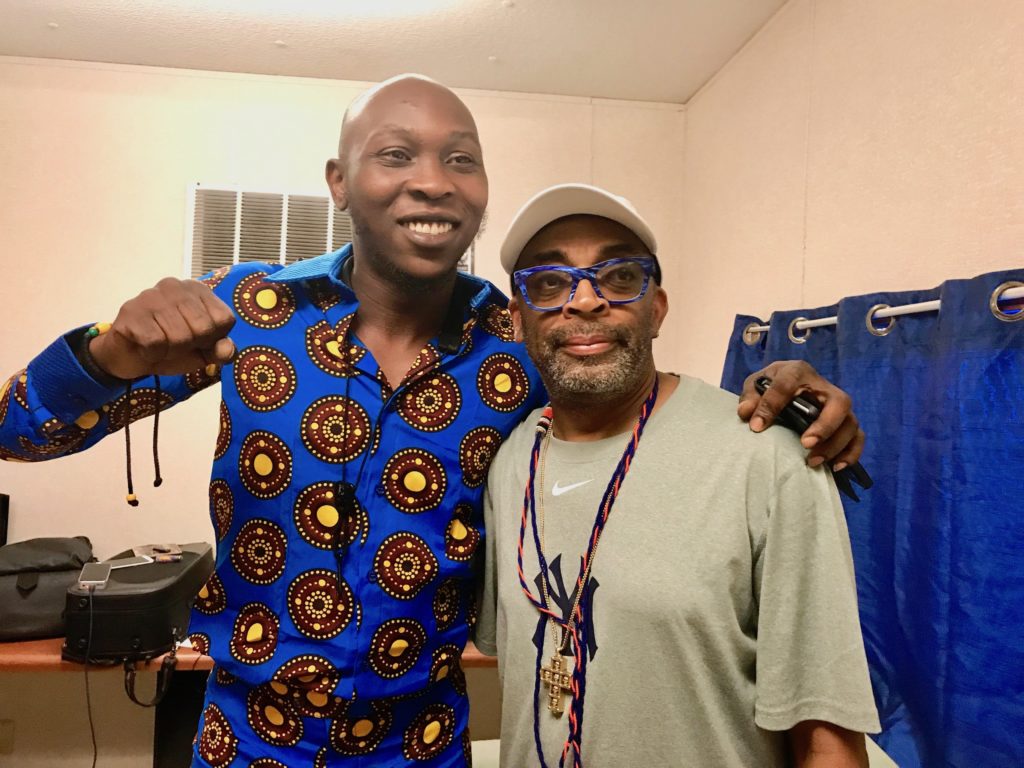
Celebrated African-American filmmaker Spike Lee hangs out with Seun Kuti backstage at the Fela Tribute Concert in New York City. Photo by Kemi Osukoya.
One of those fans who came backstage to see Seun is legendary African-American filmmaker, Spike Lee. I got a chance to listen in on their conversation as Lee discloses new found details about his ancestral root to Seun. (check out the video on our facebook page and youtube).
The moment Seun walks on stage, carrying his saxophone, the audience goes wild with excitement.
Wearing a two piece matching set, which looks like a jumpsuit, made from traditional African fabric (ankara) that includes a matching shirt, trousers and a pair of shoes, Seun slowly strides to the microphone, lifts up his saxophone mouthpiece to his mouth and skillfully blows tuneful melodies into the brass instrument’s windpipe, thus sending out rifts of Afrobeat music notes into the airwaves that quickly permeates beyond the amphitheater.
The audience, having waited long to see him perform, were already on their feet, begins applauding and shouting excitedly, dancing as the band begins to play the first song for the concert.
For a moment as I stand in the corner near the stage and watch Seun sings, plays the sax, gyrates his hips in the traditional African dance, and move across the stage, I couldn’t help but wonder how long he could keep on carrying the weight of his legendary father’s legacy. However, that perturb quickly dissipates into a sense of awe and admiration as I continue to watch him perform on stage.
The effectiveness of his performance, how effortlessly he holds his presence on stage as well as how he captivates the audience in a musical and dance spell leave no doubt in my mind and anyone else’s mind that Fela is very much alive in Seun.
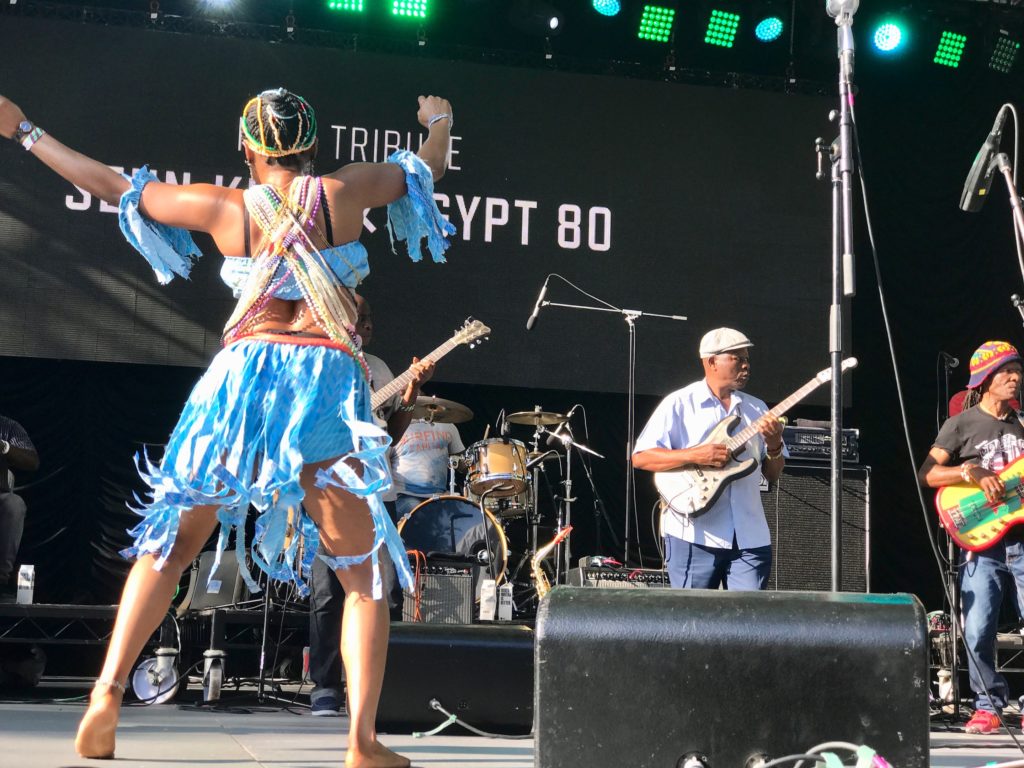
The Egypt 80 dancers perform at the Rumsey Playfield. Photo by Kemi Osukoya.
Seun continues to master his craft as his father’s shadow looms in the distance. One can only imagine how Fela is beaming with pride from up above the same way he did when Seun first auditioned at seven years old at the Apollo theater.
Africa and the world is lucky to have such a great treasure.
© 2018 THEAFRICABAZAAR magazine, a publication of Imek Media, LLC. All rights reserved.



